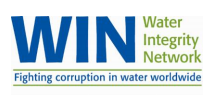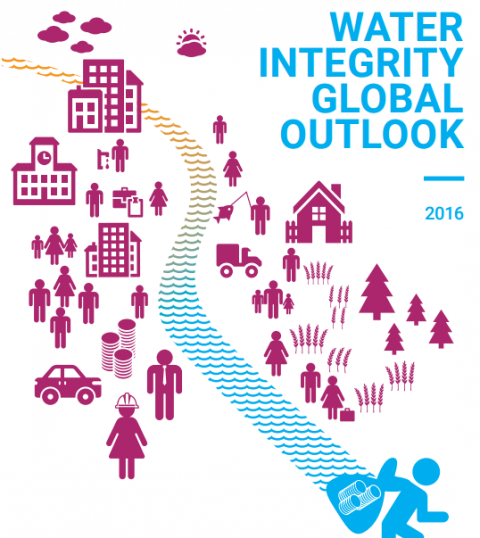Water Integrity Network launches important new report: ‘Water Integrity Global Outlook 2016’

The publication, released today on World Water Day 2016, 22 March, shows how clean governance in the water sector can fight corruption, benefit diverse stakeholders and make efficient use of investment in water services and infrastructure worldwide.
Press release: Berlin, 22 March 2016 – Each year, between US$ 770 and 1,760 billion are needed to develop water resources and services worldwide. Yet the number of people without “safe” drinking water could be as large as those who lack access to basic sanitation: around 32 per cent of the world’s population in 2015. And no less than 10 per cent of water sector investment is lost to corruption. While the human rights to water and sanitation were formally recognized by the United Nations General Assembly in 2010, the reality remains far from this goal. According to the Joint Monitoring Programme of the World Health Organization and UNICEF, some 663 million people lack access to so-called “improved” drinking water sources globally. This contributes to 1.6 million deaths annually, most of whom are children under 5 years old. Although the UN’s new 2030 Agenda includes a Sustainable Development Goal (SDG 6) on water and sanitation, action is needed so that pervasive and systemic corruption do not continue to be a significant barrier to achieving universal and equitable access to drinking water and sanitation.
Draining Public Accounts
Grand corruption cases plague the water sector worldwide.
In 2015, an audit of the €70 million phase II national water programme (PPEA II) in Benin, which included €50 million from the Netherlands and €20 million from the European Union, unveiled that €4 million had vanished from the Benin Ministry of Water. Dutch development cooperation with the government of Benin was suspended thereafter to safeguard additional funds from misuse. In 2013, Malawi’s reformed public financial management system was misused to divert US$5 million in public funds to the private accounts of officials.
A lack of transparency, accountability, and participation in water service delivery has also contributed to costly inefficiencies and failures in the West. In the United States, residents of Flint, Michigan are reeling from recent revelations of high levels of lead contamination in the city’s water supply, blamed largely on inaction by the Michigan Department of Environmental Quality, the state agency responsible for ensuring safe drinking water. According to a report by the Guardian, the resulting class action lawsuits from Flint residents may cost the state upwards of US$ 1 billion in damages.
Today, on World Water Day, the Water Integrity Network (WIN) has released a new report that documents cases like these, revealing corruption’s costly impact on the world’s water resources. It also shows the degree to which poor water governance negatively affects the world’s most vulnerable populations – specifically women, children, and the landless. This Water Integrity Global Outlook 2016, or WIGO, shares examples of both corruption and good practices from communities, private sector, civil society, and governments. WIGO demonstrates how improved governance as well as integrity and anti-corruption measures can win back an estimated US$ 75 billion for global investment in water services and infrastructure annually.

“The examples such as the Benin case, the Belo Monte Dam in Brazil, and Flint show that outright corruption or the lack of transparency, accountability, and participation are enormous obstacles to achieving human rights and the sustainable development goals,” says Frank van der Valk, WIN’s executive director.
More than Money
In many countries, say the report’s authors, public criticism of officials can lead to fines and imprisonment. In other cases, whistleblowers and activists who have sought to reveal cases of corruption have faced intimidation and violence. Pedro Canché, an independent Mexican journalist, was jailed for 10 months and charged with sabotage for filming a demonstration outside the state water commission in August 2014. After Canché’s release in May of last year, Mexican media reported that allegations of his torture were being investigated by the Comisión Ejecutiva de Atención a Víctimas, the federal agency responsible for victims and civil society organizations. Just earlier this month in Honduras, Berta Caceres and Nelson Garcia of the indigenous and environmental rights group COPINH were gunned down by unknown assailants in two separate incidents. Both are believed to have been assassinated in retaliation for their campaign against the Agua Zarca dam project. Unsurprising then that WIN’s report specifically lists whistleblower protection as a vital element of public accountability and anti-corruption success.
New Roads Ahead
Demand for water is increasing worldwide, affected by human population and consumption growth and climate change. An 85 per cent increase in water consumption is predicted in just the global energy sector by 2035. Global crop demand is predicted to see a 100 per cent increase from 2005 levels by 2050 to meet food and biofuel needs. Petty corruption and grand corruption together are threats to water governance internationally and to efforts to meet water service needs and improve water sector performance. The report is a call to action for integrity for all players — governments, private companies, civil society groups, and individual citizens worldwide. It therefore highlights and draws lessons from those examples of where governments, companies, and community groups have won gains for water consumers and environmental protection.
In Indonesia, the Jasa Tirta I Public Corporation, a state-owned but legally independent river basin organization, became a model for anti-corruption initiatives by adopting international financial accounting standards, quality management systems, and integrity tools for employees. In Sierra Leone, the Guama Valley Water Company’s tough anti-corruption reforms brought almost all illegal tampering of customer billing to an end. By 2015, gains in company revenue were enough to cover operations and maintenance. “The report proposes to build “integrity walls” from building blocks of transparency, accountability, participation and anti-corruption measures” says Van der Valk. “Urgent action by all stakeholders is required to stop the on-going waste of resources.”
For all information about the report, download the Executive Summary and the full report!
# # # ## NOTES TO EDITORS
In support of Water Action Month led by End Water Poverty, WIN will launch WIGO with an event on World Water Day, 22 March 2016, 4-6 PM, at the Ameron Hotel ABION Spreebogen Waterside, Alt-Moabit 99, 10559 Berlin, Germany. Speakers will include Dr. Tania Roediger-Vorwerk, Deputy Director-General, BMZ; Mr. Peter Glas, Chair, OECD Water Governance Initiative; Ms. Chantal Uwimana, Regional Director, Transparency International, and member, WIN Supervisory Board; and Mr. Thilo Panzerbieter, Chair, German WASH Network. WIGO is a culmination of two years of research, consultation, knowledge sharing, and collaboration with water sector stakeholders worldwide. In the coming months, WIN and its network partners will collaborate on initiatives that promote WIGO’s key policy recommendations and raise awareness of the ways by which the private and public sectors as well as civil society organizations can prioritize water integrity and act for water justice locally, nationally, and internationally.
## ABOUT WIN
The Water Integrity Network (WIN) promotes integrity to eliminate corruption and increase performance in the water sector worldwide. To achieve this mission, WIN connects, enables, and promotes the work of organizations and individuals who recognize the impact of corruption—especially on poor and marginalized communities—and work to assess risk and promote practical responses. Formerly hosted by Transparency International, the WIN global network is formally led by the WIN Association and supported by the WIN Secretariat in Berlin. For more information, visit the Water Integrity Network website.